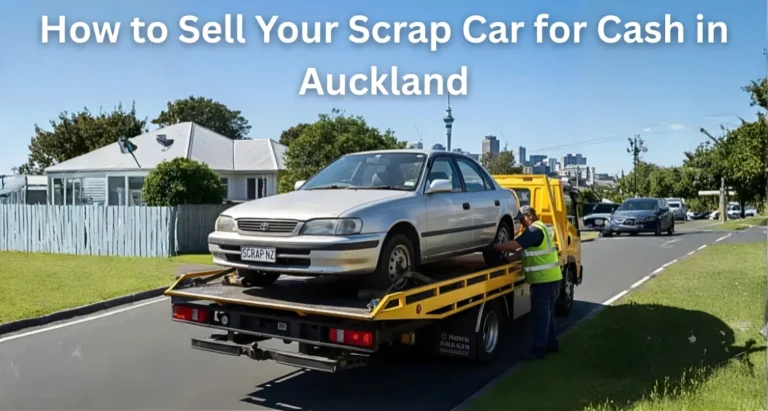Selling a scrap car for cash involves several connected steps that ensure both legal compliance and fair value. The process begins with evaluating the vehicle’s condition and confirming ownership through documents such as ReGo or an equivalent proof of title. Licensed wreckers or car removal services then assess the car based on factors like make, model, and weight before offering a payout. Even non-functional cars hold value because of their metal content and reusable parts.
Once a quote is accepted, the company arranges collection, verifies the paperwork, and provides payment on pickup. This structured approach allows car owners to turn damaged or deregistered vehicles into money while supporting responsible recycling practices. Recyclers extract metals such as steel, aluminium, and copper for reuse, which reduces landfill waste and promotes sustainable resource recovery. It is a practical way to clear space, earn cash, and contribute to environmental conservation.
Understand the Scrap Selling Process
Selling a scrap car involves several coordinated steps that ensure a smooth and legal transaction. The process starts with contacting licensed car wreckers or removal services to request a quote based on vehicle condition, make, and weight. Once the offer is accepted, the buyer verifies ownership through documents such as ReGo, arranges free or included towing, and issues payment after pickup. This structured method guarantees transparency, compliance, and proper recycling of valuable metals and parts through certified channels.
Evaluate Your Vehicle’s Condition
Your car’s condition greatly influences its scrap value and eligibility for removal. Check if it can start, roll, or be safely towed. Note signs of rust, missing parts, and fluid leaks. Functional items such as the battery, catalytic converter, and wiring can raise the final offer. Providing an accurate condition report helps wreckers give fair quotes and prevents delays during collection.
Get and Compare Multiple Quotes
Scrap car prices vary between buyers, so collecting several quotes ensures you get the best value. Contact licensed wreckers, scrap yards, or online car removal services and provide accurate details such as make, model, and condition. Some offers include towing, while others charge separately. Comparing at least three quotes helps identify the most reliable and transparent option for your vehicle.
Confirm Free Car Removal or Towing Cost
Scrap car deals often include free towing as part of the overall offer, but the terms can differ between buyers. Confirm whether the removal cost is fully covered or distance-based. Request written confirmation to avoid deductions later. Reliable wreckers usually provide complimentary pickup within service areas, ensuring a smooth, transparent process and accurate payout for the complete scrap transaction.
Prepare Legal Documents and Proof of Ownership
Ownership proof is a mandatory requirement when selling a scrap car. Gather essential documents such as the vehicle’s ReGo, registration certificate, and valid photo identification. Some wreckers may also request proof of deregistration before collection. Ensure the information matches the owner’s name on record to prevent delays. Accurate documentation guarantees a legal, traceable sale and protects both the seller and the buyer.
Remove Personal Belongings and Valuable Parts
Before handing over your scrap car, check thoroughly for personal items in the glovebox, trunk, and under seats. Remove accessories like phone mounts or GPS units and keep any valuable parts you plan to sell separately, such as upgraded stereos or custom rims. A final inspection ensures nothing important is left behind and prevents misunderstandings once the vehicle is collected.
Receive Payment and Complete Sale Record
Once the scrap car is collected and documents are verified, the buyer issues payment either in cash or by bank transfer. Always request a written receipt that includes the car’s details, sale amount, and date of transfer. Keeping a copy of this record protects both parties, provides proof of ownership change, and ensures the transaction is legally completed and traceable.
What Affects Your Scrap Car’s Value?
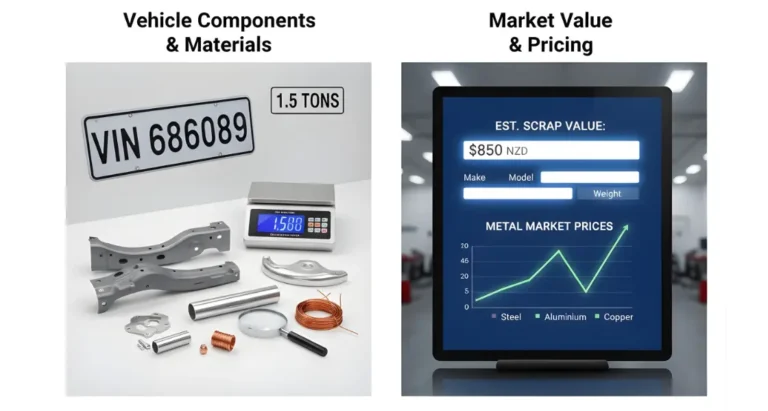
A scrap car’s value is determined by several interconnected factors that influence how much can be recovered or reused. The vehicle’s type, age, condition, and material composition all contribute to its payout potential. Market demand and recycling rates also affect what buyers are willing to offer. Understanding these key variables helps sellers estimate fair value with confidence.
Below are the main elements that influence a scrap car’s overall worth :
- Vehicle Weight and Recyclable Metals : The amount of recyclable metal in a vehicle directly influences its scrap value. Cars built with heavier frames or denser materials often return higher payouts because they contain more steel, aluminium, and copper. Scrap yards calculate prices using total vehicle weight and prevailing metal rates. Staying aware of current market trends allows sellers to estimate fair compensation before agreeing to a quote.
- Make, Model, and Part Demand : The make and model of a vehicle play a crucial role in determining its scrap value. Popular brands or newer models often fetch higher offers due to stronger demand for reusable components and parts compatibility. Vehicles from less common manufacturers may yield lower returns if replacement parts are scarce. Understanding market demand for specific models helps sellers negotiate more confidently and secure fair compensation.
- Aftermarket Parts and Modifications : Upgraded or aftermarket parts can significantly improve a scrap car’s overall value. Items such as alloy wheels, custom exhausts, or sound systems often hold resale potential beyond the car’s metal weight. However, buyers assess these upgrades based on functionality and demand. Keeping receipts or documentation for installed parts can strengthen your negotiation and help wreckers assign a higher quote during valuation.
- Salvageable or Working Components : Functional parts within a scrap car can greatly enhance its resale potential. Items such as engines, transmissions, alternators, and catalytic converters are often dismantled and resold individually. Wreckers inspect these components for usability before assigning value. A car with several working systems or reusable units usually attracts a higher payout, as these parts reduce the buyer’s reconditioning and recycling costs.
- Current Scrap Metal Prices : Scrap metal rates fluctuate frequently based on global demand, manufacturing trends, and export conditions. Metals like steel, aluminium, and copper are priced per tonne, and even small market shifts can affect total payouts. Checking updated regional rates helps sellers time their sale effectively. Since scrap yards base offers on these benchmarks, awareness of current pricing ensures fair and competitive deals.
- Local Market Demand : Regional demand plays a key role in determining a scrap car’s payout. Areas with active metal recycling facilities or strong used-parts markets often offer better prices. Conversely, locations with limited buyers or high transport costs may reduce the overall quote. Understanding local recycling activity and seasonal demand trends helps sellers choose the right time and place to secure competitive scrap offers.
Reasons You Should Scrap Your Old Car
There comes a point when keeping an old car costs more than it’s worth. Scrapping becomes a practical choice when the vehicle is no longer safe, efficient, or economical to maintain. Common triggers include frequent repairs, rusted structures, failed safety checks, or poor fuel efficiency. Each of these signs indicates declining value and reliability.
Here are some of the most common reasons why it makes sense to retire an aging vehicle :
- Repair Costs Exceed the Car’s Value : When repair costs surpass the market value of your car, scrapping becomes the smarter financial choice. Major repairs such as engine replacements, transmission rebuilds, or suspension overhauls can cost more than what the car is worth. For example, spending $2,000 to fix a vehicle valued at $800 offers no return, making scrapping a more economical decision.
- Excessive Rust and Frame Damage : Severe rust or frame damage can compromise a car’s safety and structural integrity. Once corrosion spreads through the underbody or frame, repair becomes both difficult and costly. Visible holes, crumbling panels, and flaking metal are signs of advanced deterioration. In such cases, the vehicle may fail inspections and pose safety risks, making scrapping the most practical option.
- Failed Safety Features and WoF : If a vehicle fails safety inspections or cannot pass its Warrant of Fitness (WoF), it may no longer be worth repairing. Common causes include worn brakes, damaged seatbelts, faulty lights, or non-functioning airbags. Repeated failures make the car unsafe and costly to maintain, often leading owners to scrap it rather than continue investing in compliance repairs.
- High Mileage and Fuel Inefficiency : Vehicles with high mileage often experience reduced fuel efficiency and increased wear on major components. Engines, transmissions, and exhaust systems lose performance over time, raising running and repair costs. When a car surpasses 200,000 kilometers and starts consuming more fuel, its value typically declines, making scrapping a smarter choice than continuous maintenance or refueling.
- Frequent Breakdowns or Driving Issues : When a car begins breaking down repeatedly or struggles to operate reliably, it signals deeper mechanical problems. Persistent stalling, engine overheating, or transmission slips can make daily driving unsafe and costly. Frequent repairs rarely restore long-term reliability, and the accumulated expense often exceeds the car’s remaining value, making scrapping a more sensible and stress-free option.
Essential Legal and Documentation Steps
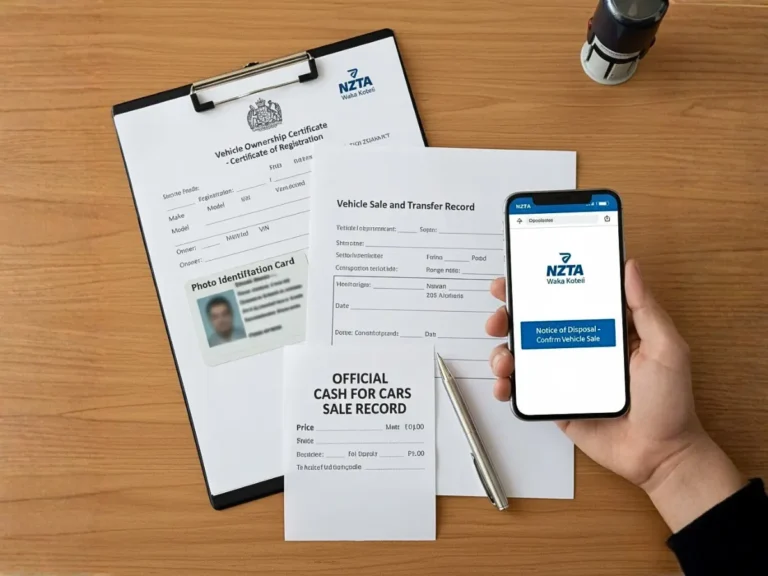
Scrapping a car is not only about its physical removal but also about completing the required legal procedures to finalize the transfer. Providing ownership proof, cancelling the vehicle registration, and recording the sale ensure the car is no longer linked to your name. These actions protect you from future liability, prevent potential fines, and ensure the process meets all local compliance requirements.
Provide Ownership Proof or ReGo
Proving ownership is one of the first and most important steps when scrapping a vehicle. In Auckland, this typically involves presenting the ReGo or registration document, along with valid photo identification. Buyers use these details to verify the seller’s authority to dispose of the car. This verification ensures the transaction is legitimate, traceable, and fully compliant.
Cancel Insurance and Vehicle Registration
Once your car has been sold or scrapped, it is essential to cancel both its insurance policy and vehicle registration. This prevents unnecessary charges and ensures official records are updated. Contact your insurer to end the policy and notify the New Zealand Transport Agency (NZTA) to deregister the vehicle. Completing these steps removes future liability and confirms ownership transfer.
Record the Transaction and Final Offer
Keeping a written record of your scrap car sale is essential for clarity and protection. The record should include the buyer’s name, amount paid, sale date, and confirmation that the vehicle was sold for dismantling. Store both digital and physical copies of this document to avoid disputes and maintain proof of the completed transaction.
Understand Penalties for Abandoned Vehicles
Abandoning a vehicle can lead to serious fines and legal consequences. Councils may remove it at the owner’s expense or issue penalties if it becomes a hazard or public nuisance. These rules apply even on private property. Properly scrapping and deregistering the car with the New Zealand Transport Agency (NZTA) ensures you remain compliant and avoid penalties.
Where to Sell: Platforms and Providers
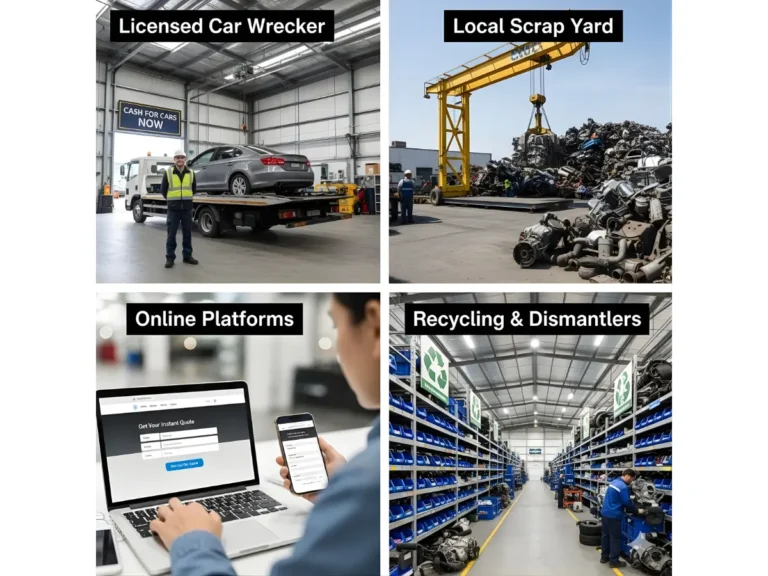
Car owners have several options when deciding where to sell or scrap their vehicle, each offering different advantages based on convenience, pricing, and environmental practices. The main choices include licensed wreckers, local scrap yards, online platforms, and recycling centres. Each serves a unique purpose in the car disposal process, which helps sellers find the most practical route for their situation.
Here’s how each option works :
- Licensed Car Wreckers : When a car is too damaged or old to resell, licensed wreckers are often the most practical solution. These professionals purchase vehicles for dismantling and recycling, offering free pickup, quick inspections, and instant payments. Choosing a licensed provider ensures legal compliance, proper documentation, and environmentally responsible disposal for end-of-life vehicles.
- Local Scrap Yards : When convenience and speed matter, local scrap yards provide a simple way to sell a car for its metal value. These yards primarily buy vehicles based on weight and current scrap metal market rates rather than reusable parts. Some offer towing, while others require drop-off. This option suits sellers with easy transport access who prefer a quick, paperwork-light transaction.
- Online Scrap Car Platforms : For those wanting a fast and hassle-free sale, online scrap car platforms offer a convenient digital solution. They connect sellers with multiple buyers through one interface, allowing users to enter vehicle details, receive instant quotes, and schedule free pickups. Most platforms handle digital paperwork and payments, making them ideal for quick, contactless transactions.
- Recycling Centres and Auto Dismantlers : When a car reaches the end of its life, some sellers prefer disposal methods that benefit the environment as well as their wallet. Recycling centres and auto dismantlers make this possible by breaking down vehicles safely, separating reusable parts and recyclable materials, and handling hazardous substances with care. They often provide fair cash payouts and full documentation, ensuring both sustainability and legal compliance.
Valuable Car Parts to Consider Removing
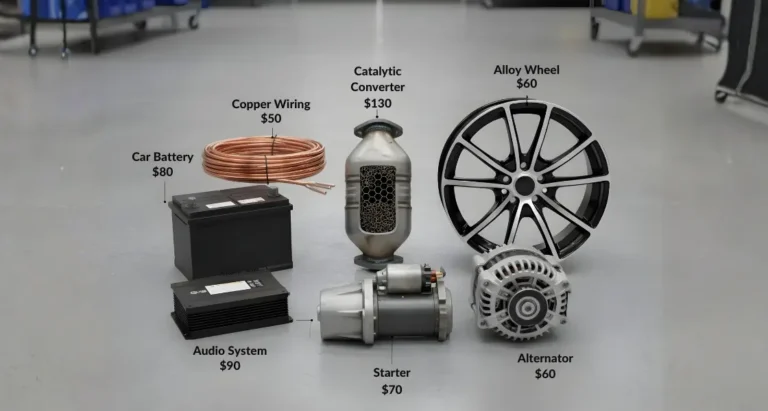
Before scrapping a car, it can be worthwhile to identify parts that still hold resale or recycling value. Components such as catalytic converters, batteries, copper wiring, or aftermarket accessories often fetch good returns if sold separately. Removing these items beforehand can increase total profit, provided the sale remains transparent.
Here are some of the most valuable car parts worth considering before the vehicle is collected :
Understand Penalties for Abandoned Vehicles
Before scrapping a car, it can be worthwhile to identify parts that still hold resale or recycling value. Components such as catalytic converters, batteries, copper wiring, or aftermarket accessories often fetch good returns if sold separately. Removing these items beforehand can increase total profit, provided the sale remains transparent.
Here are some of the most valuable car parts worth considering before the vehicle is collected :
Catalytic Converter and Exhaust System
The catalytic converter is often the most valuable part of a scrap vehicle because it contains precious metals such as platinum, palladium, and rhodium. If the converter is intact, buyers may offer higher quotes, or it can be sold separately for greater value. The exhaust system also holds moderate worth if its key components remain in good condition.
High-Value Aftermarket Accessories
Aftermarket upgrades such as custom wheels, audio systems, and suspension kits can retain strong resale value even when the car itself is ready for scrap. These parts are often removed and sold separately to buyers or online. However, sellers should always disclose removed accessories to ensure transparent transactions and avoid disputes during the sale process.
Reusable Engine and Transmission Parts
Engines and transmissions often retain considerable value, especially if the car was operational before scrapping. Mechanics and auto recyclers frequently purchase these components for repairs or replacements. Even if not fully functional, parts such as alternators, starters, and sensors can still be reused. Leaving them intact may also help secure a higher scrap quote.
Frequently Asked Questions
How much do wreckers pay for cars in NZ?
Wreckers in New Zealand usually pay between $300 and $10,000 for vehicles, depending on the make, model, condition, and weight. Cars that are complete, drivable, or contain valuable parts like engines and catalytic converters often receive higher payouts. Heavier vehicles such as SUVs or utes also earn more due to their metal content. Prices change with metal market rates and buyer demand, so comparing quotes from at least three licensed wreckers ensures fair value. Always confirm whether the offer includes towing and on-the-spot payment before agreeing to the sale.
What’s the most expensive part of a scrap car?
The catalytic converter is the single most valuable part of most scrap cars. It contains platinum, palladium, and rhodium, which are sold to refineries for high resale value. Depending on the vehicle’s make and model, converters can fetch between $50 and $1,000 or more. Other high-value components include alloy wheels, car batteries, and electric modules, but none match the converter’s worth. Keeping it intact or selling it separately can increase overall returns. Buyers typically offer higher quotes when the catalytic converter is still fitted and undamaged.
Is it better to scrap or sell my old car?
If your car’s repair costs exceed its resale value, scrapping it is generally the better option. Non-running, damaged, or deregistered vehicles often cost more to fix than they’re worth. Scrapping provides instant payment, free removal, and no ongoing maintenance costs. Selling privately might offer slightly more money, but only if the vehicle is in good condition and roadworthy. For most old or high-mileage cars, scrapping is faster, easier, and more practical. Always compare offers from both wreckers and private buyers before making a final decision.
What car brands hold value best when scrapped?
Luxury European brands such as Audi, BMW, Mercedes-Benz, Porsche, and Volkswagen hold the highest scrap value because of their high-quality materials and valuable components. These vehicles contain premium engines, complex electronics, and catalytic converters rich in precious metals. Among mainstream models, Toyota, Honda, and Mitsubishi cars retain good value because their parts are in high demand and easily reused. The final scrap payout depends on the condition, model year, and part availability, but well-built or widely used brands typically fetch stronger offers from wreckers.
How do I find the best scrap quote online?
To get the best online scrap quote, submit accurate details about your car’s make, model, year, condition, and location to multiple platforms. Compare offers from at least three wreckers or removal services to identify fair pricing. Check that towing, paperwork, and same-day payment are included in the quote. Be transparent about whether key parts like the catalytic converter or battery are intact, as this affects the offer. Reliable platforms display verified buyer reviews and provide clear, fixed quotes without hidden fees or deductions.
How high is too high for mileage?
A vehicle is usually considered high-mileage once it exceeds 200,000 kilometres (around 125,000 miles). After this point, engines, transmissions, and suspension components experience significant wear, increasing the risk of breakdowns and expensive repairs. High mileage also lowers resale value, making scrapping a more practical choice. Well-maintained vehicles may still perform well, but consistent issues such as oil leaks, overheating, or poor fuel efficiency indicate declining reliability. If ongoing maintenance becomes costly or unpredictable, it’s often time to retire the vehicle for scrap value.

